Assessment of the Protection of Individual Rights to Privacy in the UK
VerifiedAdded on 2022/11/24
|8
|2255
|231
Essay
AI Summary
This essay examines the protection of individual rights to privacy in the UK, focusing on the Human Rights Act 1998 (HRA) and its incorporation of the European Convention on Human Rights (ECHR). It explores the definition and importance of privacy, referencing Article 8 of the HRA and relevant case law. The essay argues that UK law may not adequately protect individual privacy, providing evidence from various cases and statutes. It discusses the mechanisms of the HRA, including sections 2, 3, 4, and 6, and analyzes how these provisions impact the interpretation of legislation and the actions of public authorities. The essay also considers the historical context of privacy rights in the UK, comparing it to the United States and examining the evolution of privacy law through cases like Malone v Metropolitan Police Commissioner and Campbell v MGN. The analysis highlights the challenges and limitations in protecting individual privacy within the UK legal framework.
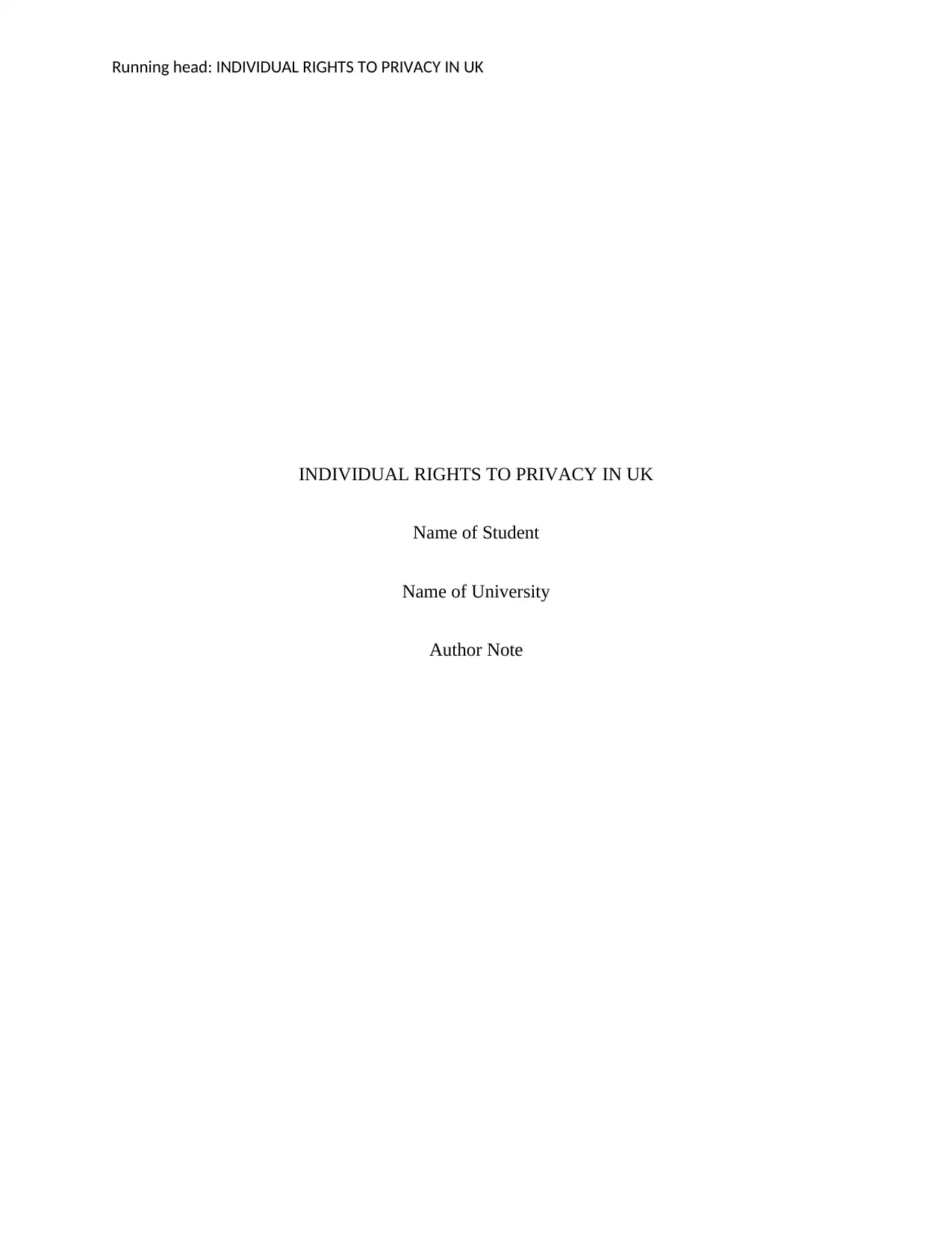
Running head: INDIVIDUAL RIGHTS TO PRIVACY IN UK
INDIVIDUAL RIGHTS TO PRIVACY IN UK
Name of Student
Name of University
Author Note
INDIVIDUAL RIGHTS TO PRIVACY IN UK
Name of Student
Name of University
Author Note
Paraphrase This Document
Need a fresh take? Get an instant paraphrase of this document with our AI Paraphraser
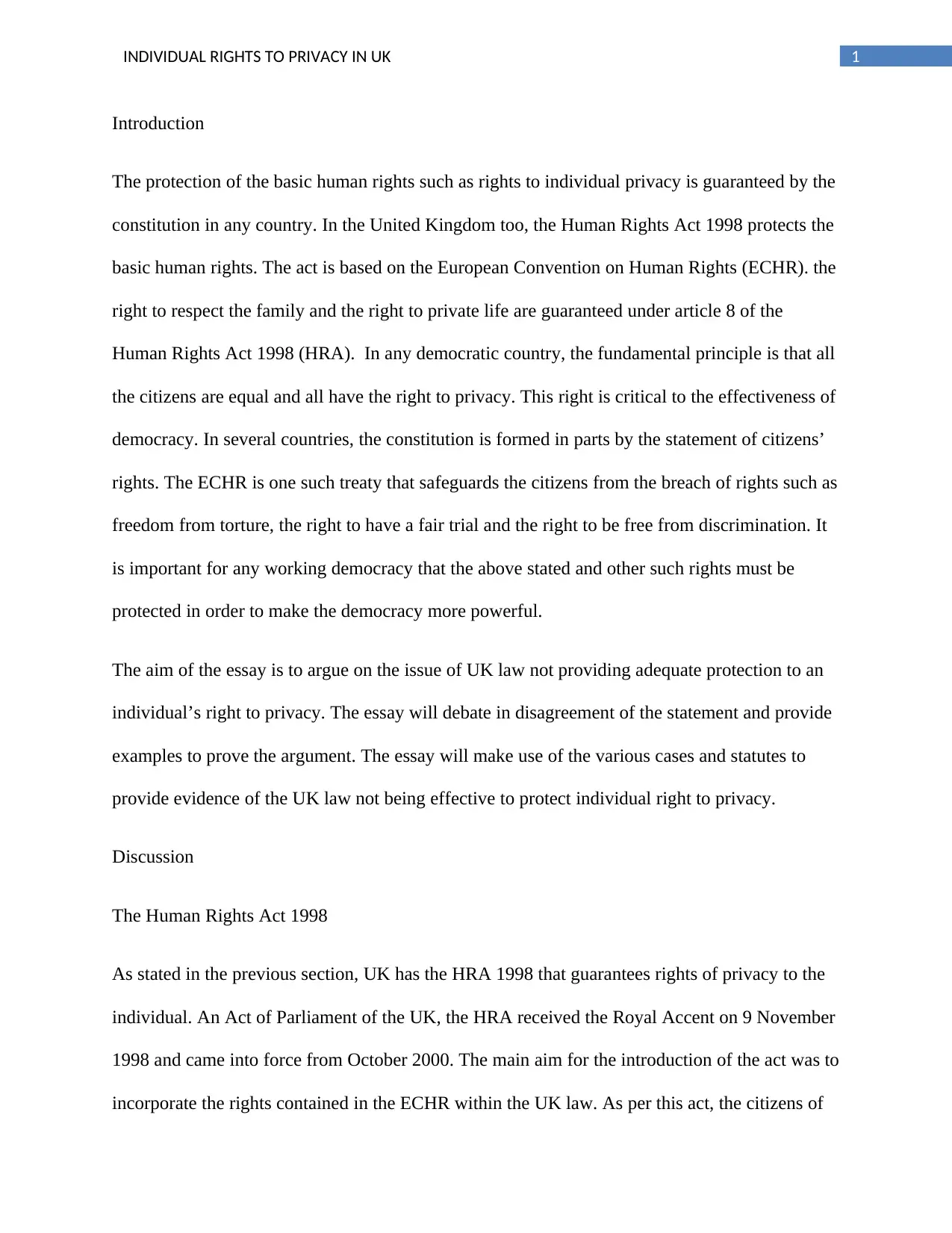
1INDIVIDUAL RIGHTS TO PRIVACY IN UK
Introduction
The protection of the basic human rights such as rights to individual privacy is guaranteed by the
constitution in any country. In the United Kingdom too, the Human Rights Act 1998 protects the
basic human rights. The act is based on the European Convention on Human Rights (ECHR). the
right to respect the family and the right to private life are guaranteed under article 8 of the
Human Rights Act 1998 (HRA). In any democratic country, the fundamental principle is that all
the citizens are equal and all have the right to privacy. This right is critical to the effectiveness of
democracy. In several countries, the constitution is formed in parts by the statement of citizens’
rights. The ECHR is one such treaty that safeguards the citizens from the breach of rights such as
freedom from torture, the right to have a fair trial and the right to be free from discrimination. It
is important for any working democracy that the above stated and other such rights must be
protected in order to make the democracy more powerful.
The aim of the essay is to argue on the issue of UK law not providing adequate protection to an
individual’s right to privacy. The essay will debate in disagreement of the statement and provide
examples to prove the argument. The essay will make use of the various cases and statutes to
provide evidence of the UK law not being effective to protect individual right to privacy.
Discussion
The Human Rights Act 1998
As stated in the previous section, UK has the HRA 1998 that guarantees rights of privacy to the
individual. An Act of Parliament of the UK, the HRA received the Royal Accent on 9 November
1998 and came into force from October 2000. The main aim for the introduction of the act was to
incorporate the rights contained in the ECHR within the UK law. As per this act, the citizens of
Introduction
The protection of the basic human rights such as rights to individual privacy is guaranteed by the
constitution in any country. In the United Kingdom too, the Human Rights Act 1998 protects the
basic human rights. The act is based on the European Convention on Human Rights (ECHR). the
right to respect the family and the right to private life are guaranteed under article 8 of the
Human Rights Act 1998 (HRA). In any democratic country, the fundamental principle is that all
the citizens are equal and all have the right to privacy. This right is critical to the effectiveness of
democracy. In several countries, the constitution is formed in parts by the statement of citizens’
rights. The ECHR is one such treaty that safeguards the citizens from the breach of rights such as
freedom from torture, the right to have a fair trial and the right to be free from discrimination. It
is important for any working democracy that the above stated and other such rights must be
protected in order to make the democracy more powerful.
The aim of the essay is to argue on the issue of UK law not providing adequate protection to an
individual’s right to privacy. The essay will debate in disagreement of the statement and provide
examples to prove the argument. The essay will make use of the various cases and statutes to
provide evidence of the UK law not being effective to protect individual right to privacy.
Discussion
The Human Rights Act 1998
As stated in the previous section, UK has the HRA 1998 that guarantees rights of privacy to the
individual. An Act of Parliament of the UK, the HRA received the Royal Accent on 9 November
1998 and came into force from October 2000. The main aim for the introduction of the act was to
incorporate the rights contained in the ECHR within the UK law. As per this act, the citizens of
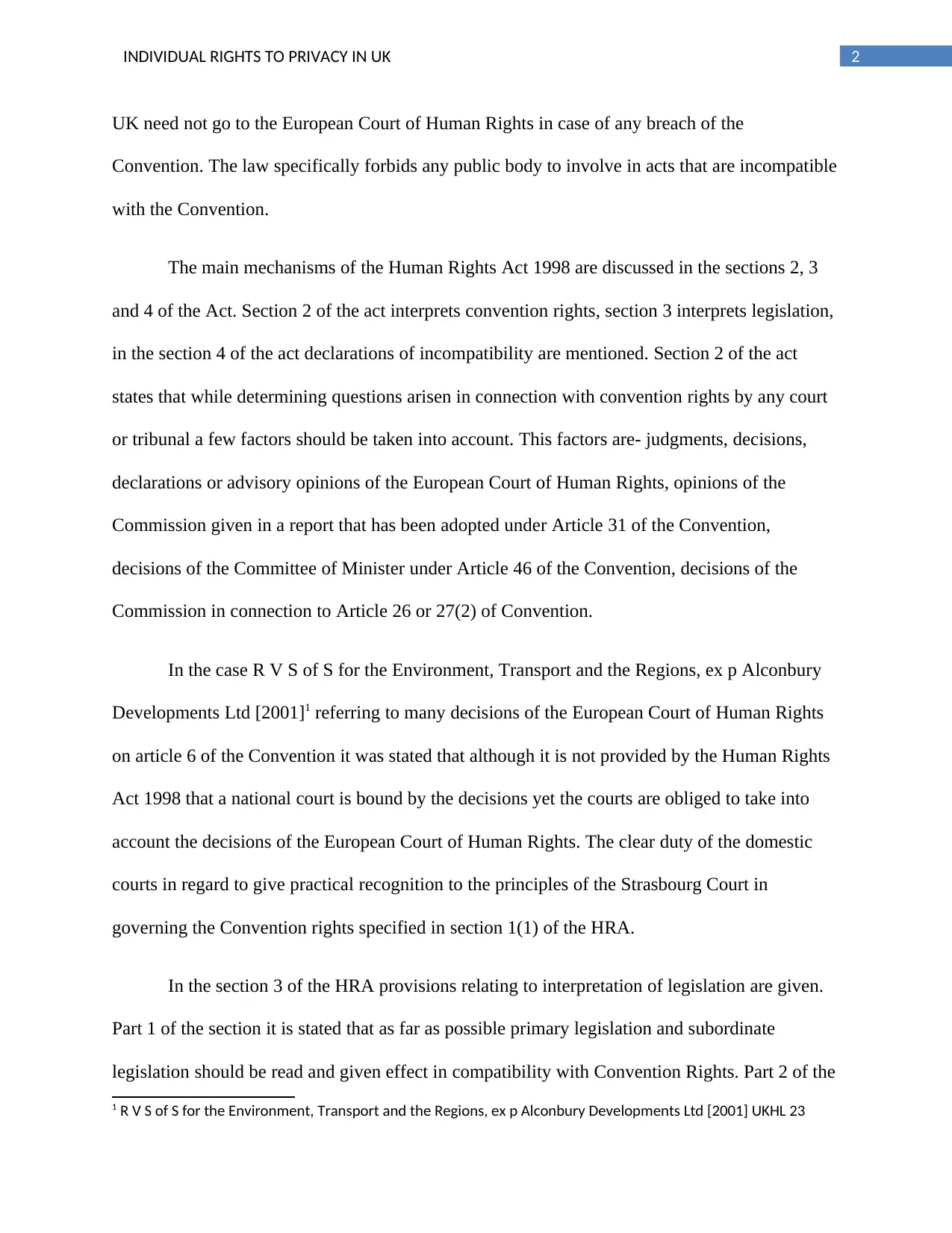
2INDIVIDUAL RIGHTS TO PRIVACY IN UK
UK need not go to the European Court of Human Rights in case of any breach of the
Convention. The law specifically forbids any public body to involve in acts that are incompatible
with the Convention.
The main mechanisms of the Human Rights Act 1998 are discussed in the sections 2, 3
and 4 of the Act. Section 2 of the act interprets convention rights, section 3 interprets legislation,
in the section 4 of the act declarations of incompatibility are mentioned. Section 2 of the act
states that while determining questions arisen in connection with convention rights by any court
or tribunal a few factors should be taken into account. This factors are- judgments, decisions,
declarations or advisory opinions of the European Court of Human Rights, opinions of the
Commission given in a report that has been adopted under Article 31 of the Convention,
decisions of the Committee of Minister under Article 46 of the Convention, decisions of the
Commission in connection to Article 26 or 27(2) of Convention.
In the case R V S of S for the Environment, Transport and the Regions, ex p Alconbury
Developments Ltd [2001]1 referring to many decisions of the European Court of Human Rights
on article 6 of the Convention it was stated that although it is not provided by the Human Rights
Act 1998 that a national court is bound by the decisions yet the courts are obliged to take into
account the decisions of the European Court of Human Rights. The clear duty of the domestic
courts in regard to give practical recognition to the principles of the Strasbourg Court in
governing the Convention rights specified in section 1(1) of the HRA.
In the section 3 of the HRA provisions relating to interpretation of legislation are given.
Part 1 of the section it is stated that as far as possible primary legislation and subordinate
legislation should be read and given effect in compatibility with Convention Rights. Part 2 of the
1 R V S of S for the Environment, Transport and the Regions, ex p Alconbury Developments Ltd [2001] UKHL 23
UK need not go to the European Court of Human Rights in case of any breach of the
Convention. The law specifically forbids any public body to involve in acts that are incompatible
with the Convention.
The main mechanisms of the Human Rights Act 1998 are discussed in the sections 2, 3
and 4 of the Act. Section 2 of the act interprets convention rights, section 3 interprets legislation,
in the section 4 of the act declarations of incompatibility are mentioned. Section 2 of the act
states that while determining questions arisen in connection with convention rights by any court
or tribunal a few factors should be taken into account. This factors are- judgments, decisions,
declarations or advisory opinions of the European Court of Human Rights, opinions of the
Commission given in a report that has been adopted under Article 31 of the Convention,
decisions of the Committee of Minister under Article 46 of the Convention, decisions of the
Commission in connection to Article 26 or 27(2) of Convention.
In the case R V S of S for the Environment, Transport and the Regions, ex p Alconbury
Developments Ltd [2001]1 referring to many decisions of the European Court of Human Rights
on article 6 of the Convention it was stated that although it is not provided by the Human Rights
Act 1998 that a national court is bound by the decisions yet the courts are obliged to take into
account the decisions of the European Court of Human Rights. The clear duty of the domestic
courts in regard to give practical recognition to the principles of the Strasbourg Court in
governing the Convention rights specified in section 1(1) of the HRA.
In the section 3 of the HRA provisions relating to interpretation of legislation are given.
Part 1 of the section it is stated that as far as possible primary legislation and subordinate
legislation should be read and given effect in compatibility with Convention Rights. Part 2 of the
1 R V S of S for the Environment, Transport and the Regions, ex p Alconbury Developments Ltd [2001] UKHL 23
⊘ This is a preview!⊘
Do you want full access?
Subscribe today to unlock all pages.

Trusted by 1+ million students worldwide
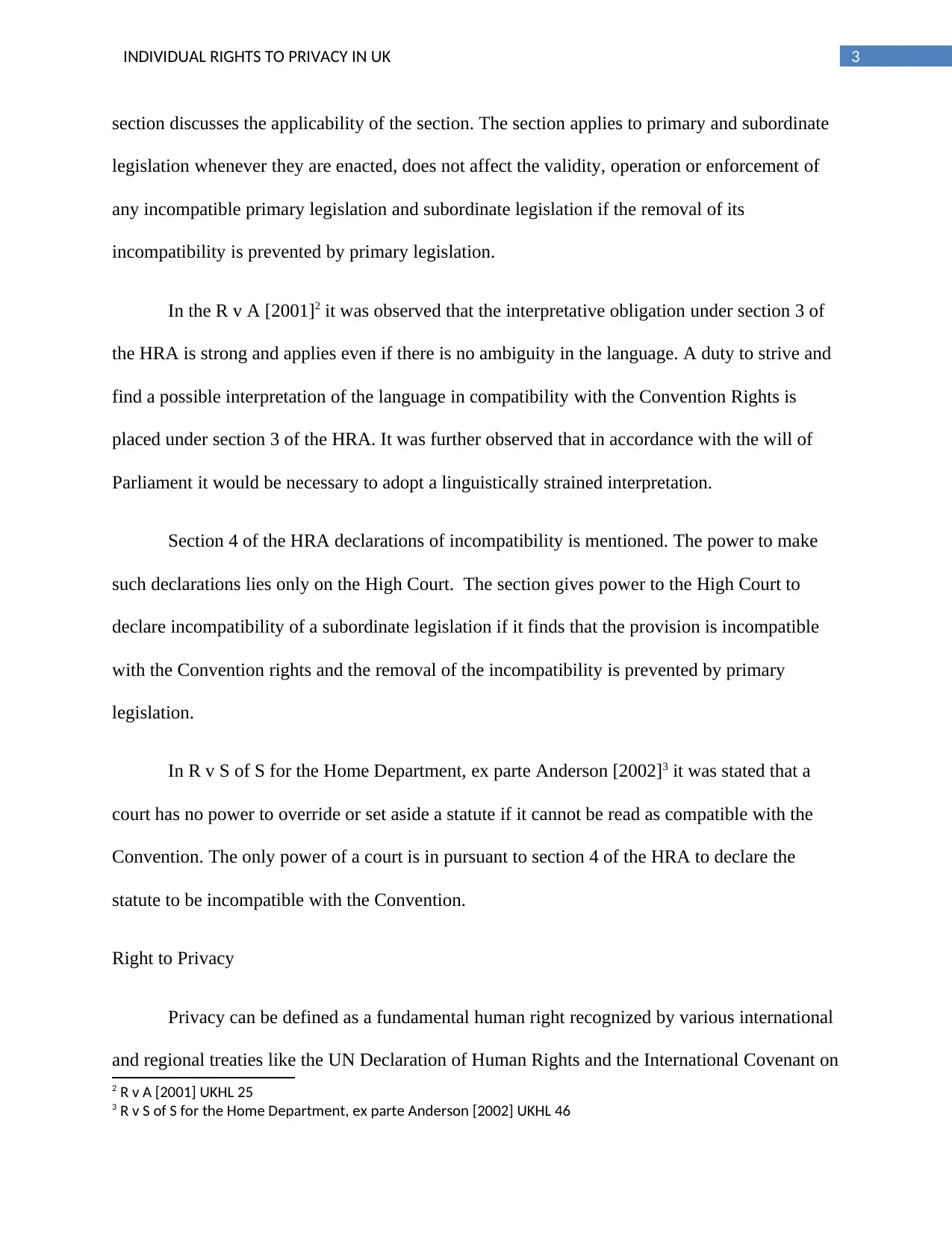
3INDIVIDUAL RIGHTS TO PRIVACY IN UK
section discusses the applicability of the section. The section applies to primary and subordinate
legislation whenever they are enacted, does not affect the validity, operation or enforcement of
any incompatible primary legislation and subordinate legislation if the removal of its
incompatibility is prevented by primary legislation.
In the R v A [2001]2 it was observed that the interpretative obligation under section 3 of
the HRA is strong and applies even if there is no ambiguity in the language. A duty to strive and
find a possible interpretation of the language in compatibility with the Convention Rights is
placed under section 3 of the HRA. It was further observed that in accordance with the will of
Parliament it would be necessary to adopt a linguistically strained interpretation.
Section 4 of the HRA declarations of incompatibility is mentioned. The power to make
such declarations lies only on the High Court. The section gives power to the High Court to
declare incompatibility of a subordinate legislation if it finds that the provision is incompatible
with the Convention rights and the removal of the incompatibility is prevented by primary
legislation.
In R v S of S for the Home Department, ex parte Anderson [2002]3 it was stated that a
court has no power to override or set aside a statute if it cannot be read as compatible with the
Convention. The only power of a court is in pursuant to section 4 of the HRA to declare the
statute to be incompatible with the Convention.
Right to Privacy
Privacy can be defined as a fundamental human right recognized by various international
and regional treaties like the UN Declaration of Human Rights and the International Covenant on
2 R v A [2001] UKHL 25
3 R v S of S for the Home Department, ex parte Anderson [2002] UKHL 46
section discusses the applicability of the section. The section applies to primary and subordinate
legislation whenever they are enacted, does not affect the validity, operation or enforcement of
any incompatible primary legislation and subordinate legislation if the removal of its
incompatibility is prevented by primary legislation.
In the R v A [2001]2 it was observed that the interpretative obligation under section 3 of
the HRA is strong and applies even if there is no ambiguity in the language. A duty to strive and
find a possible interpretation of the language in compatibility with the Convention Rights is
placed under section 3 of the HRA. It was further observed that in accordance with the will of
Parliament it would be necessary to adopt a linguistically strained interpretation.
Section 4 of the HRA declarations of incompatibility is mentioned. The power to make
such declarations lies only on the High Court. The section gives power to the High Court to
declare incompatibility of a subordinate legislation if it finds that the provision is incompatible
with the Convention rights and the removal of the incompatibility is prevented by primary
legislation.
In R v S of S for the Home Department, ex parte Anderson [2002]3 it was stated that a
court has no power to override or set aside a statute if it cannot be read as compatible with the
Convention. The only power of a court is in pursuant to section 4 of the HRA to declare the
statute to be incompatible with the Convention.
Right to Privacy
Privacy can be defined as a fundamental human right recognized by various international
and regional treaties like the UN Declaration of Human Rights and the International Covenant on
2 R v A [2001] UKHL 25
3 R v S of S for the Home Department, ex parte Anderson [2002] UKHL 46
Paraphrase This Document
Need a fresh take? Get an instant paraphrase of this document with our AI Paraphraser
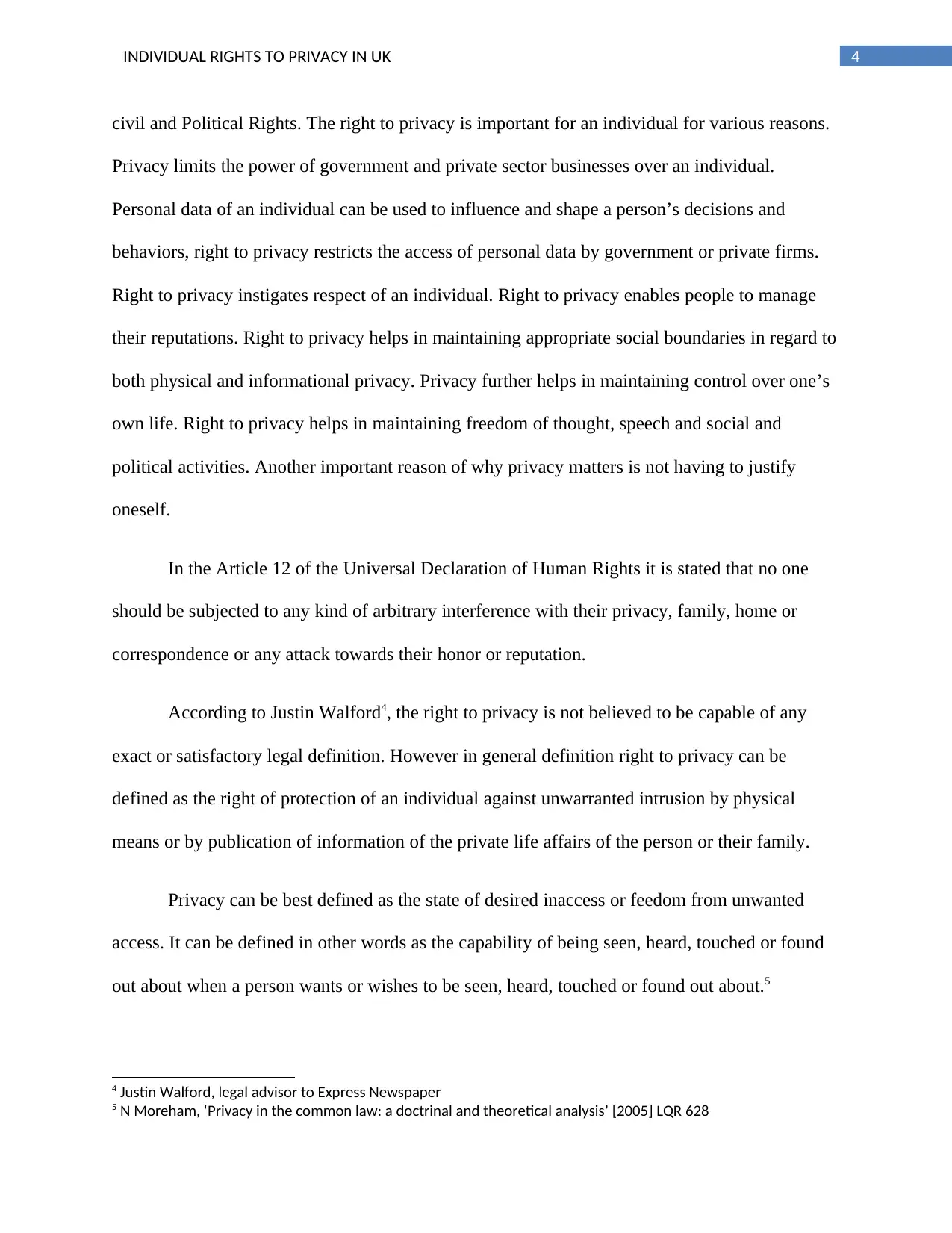
4INDIVIDUAL RIGHTS TO PRIVACY IN UK
civil and Political Rights. The right to privacy is important for an individual for various reasons.
Privacy limits the power of government and private sector businesses over an individual.
Personal data of an individual can be used to influence and shape a person’s decisions and
behaviors, right to privacy restricts the access of personal data by government or private firms.
Right to privacy instigates respect of an individual. Right to privacy enables people to manage
their reputations. Right to privacy helps in maintaining appropriate social boundaries in regard to
both physical and informational privacy. Privacy further helps in maintaining control over one’s
own life. Right to privacy helps in maintaining freedom of thought, speech and social and
political activities. Another important reason of why privacy matters is not having to justify
oneself.
In the Article 12 of the Universal Declaration of Human Rights it is stated that no one
should be subjected to any kind of arbitrary interference with their privacy, family, home or
correspondence or any attack towards their honor or reputation.
According to Justin Walford4, the right to privacy is not believed to be capable of any
exact or satisfactory legal definition. However in general definition right to privacy can be
defined as the right of protection of an individual against unwarranted intrusion by physical
means or by publication of information of the private life affairs of the person or their family.
Privacy can be best defined as the state of desired inaccess or feedom from unwanted
access. It can be defined in other words as the capability of being seen, heard, touched or found
out about when a person wants or wishes to be seen, heard, touched or found out about.5
4 Justin Walford, legal advisor to Express Newspaper
5 N Moreham, ‘Privacy in the common law: a doctrinal and theoretical analysis’ [2005] LQR 628
civil and Political Rights. The right to privacy is important for an individual for various reasons.
Privacy limits the power of government and private sector businesses over an individual.
Personal data of an individual can be used to influence and shape a person’s decisions and
behaviors, right to privacy restricts the access of personal data by government or private firms.
Right to privacy instigates respect of an individual. Right to privacy enables people to manage
their reputations. Right to privacy helps in maintaining appropriate social boundaries in regard to
both physical and informational privacy. Privacy further helps in maintaining control over one’s
own life. Right to privacy helps in maintaining freedom of thought, speech and social and
political activities. Another important reason of why privacy matters is not having to justify
oneself.
In the Article 12 of the Universal Declaration of Human Rights it is stated that no one
should be subjected to any kind of arbitrary interference with their privacy, family, home or
correspondence or any attack towards their honor or reputation.
According to Justin Walford4, the right to privacy is not believed to be capable of any
exact or satisfactory legal definition. However in general definition right to privacy can be
defined as the right of protection of an individual against unwarranted intrusion by physical
means or by publication of information of the private life affairs of the person or their family.
Privacy can be best defined as the state of desired inaccess or feedom from unwanted
access. It can be defined in other words as the capability of being seen, heard, touched or found
out about when a person wants or wishes to be seen, heard, touched or found out about.5
4 Justin Walford, legal advisor to Express Newspaper
5 N Moreham, ‘Privacy in the common law: a doctrinal and theoretical analysis’ [2005] LQR 628
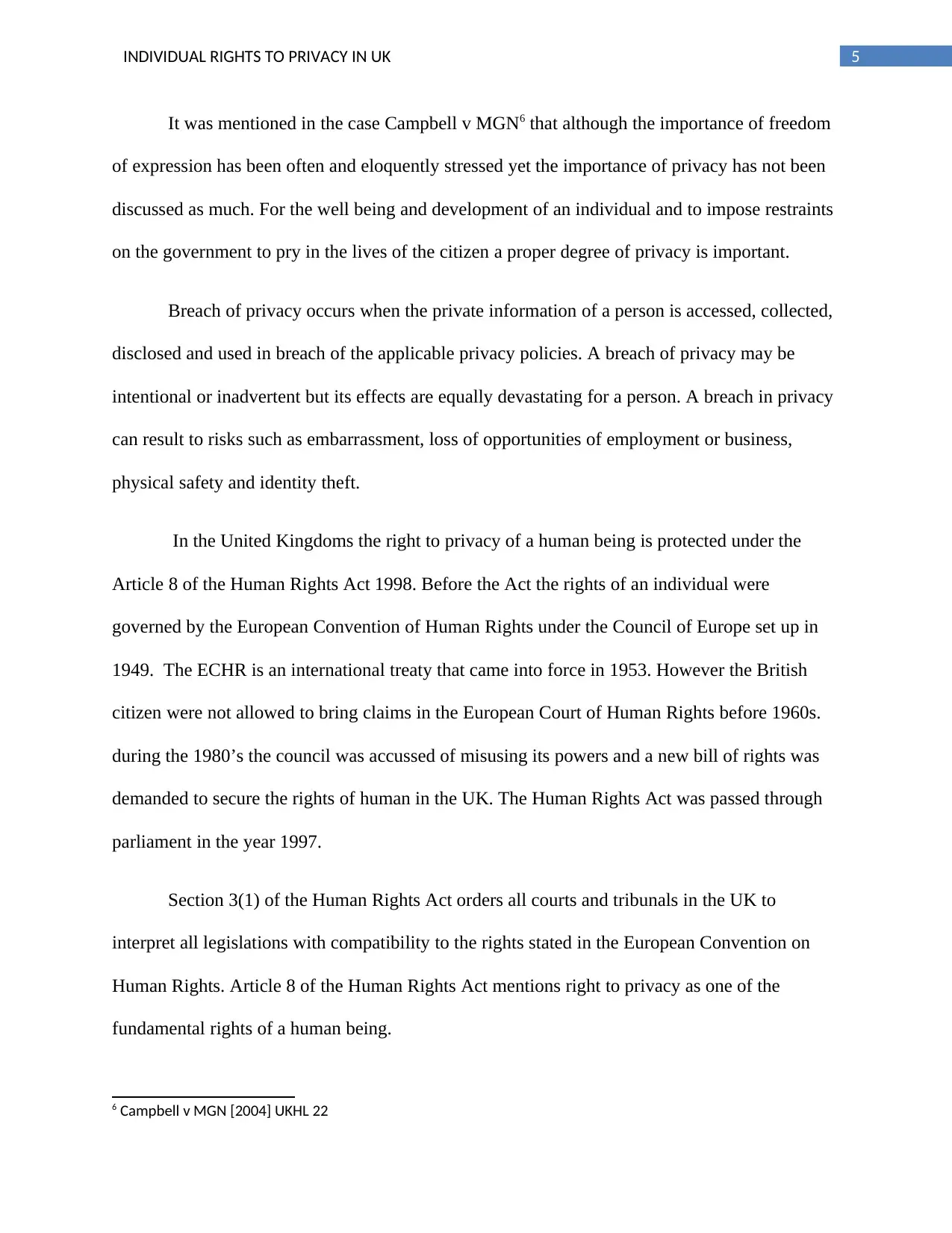
5INDIVIDUAL RIGHTS TO PRIVACY IN UK
It was mentioned in the case Campbell v MGN6 that although the importance of freedom
of expression has been often and eloquently stressed yet the importance of privacy has not been
discussed as much. For the well being and development of an individual and to impose restraints
on the government to pry in the lives of the citizen a proper degree of privacy is important.
Breach of privacy occurs when the private information of a person is accessed, collected,
disclosed and used in breach of the applicable privacy policies. A breach of privacy may be
intentional or inadvertent but its effects are equally devastating for a person. A breach in privacy
can result to risks such as embarrassment, loss of opportunities of employment or business,
physical safety and identity theft.
In the United Kingdoms the right to privacy of a human being is protected under the
Article 8 of the Human Rights Act 1998. Before the Act the rights of an individual were
governed by the European Convention of Human Rights under the Council of Europe set up in
1949. The ECHR is an international treaty that came into force in 1953. However the British
citizen were not allowed to bring claims in the European Court of Human Rights before 1960s.
during the 1980’s the council was accussed of misusing its powers and a new bill of rights was
demanded to secure the rights of human in the UK. The Human Rights Act was passed through
parliament in the year 1997.
Section 3(1) of the Human Rights Act orders all courts and tribunals in the UK to
interpret all legislations with compatibility to the rights stated in the European Convention on
Human Rights. Article 8 of the Human Rights Act mentions right to privacy as one of the
fundamental rights of a human being.
6 Campbell v MGN [2004] UKHL 22
It was mentioned in the case Campbell v MGN6 that although the importance of freedom
of expression has been often and eloquently stressed yet the importance of privacy has not been
discussed as much. For the well being and development of an individual and to impose restraints
on the government to pry in the lives of the citizen a proper degree of privacy is important.
Breach of privacy occurs when the private information of a person is accessed, collected,
disclosed and used in breach of the applicable privacy policies. A breach of privacy may be
intentional or inadvertent but its effects are equally devastating for a person. A breach in privacy
can result to risks such as embarrassment, loss of opportunities of employment or business,
physical safety and identity theft.
In the United Kingdoms the right to privacy of a human being is protected under the
Article 8 of the Human Rights Act 1998. Before the Act the rights of an individual were
governed by the European Convention of Human Rights under the Council of Europe set up in
1949. The ECHR is an international treaty that came into force in 1953. However the British
citizen were not allowed to bring claims in the European Court of Human Rights before 1960s.
during the 1980’s the council was accussed of misusing its powers and a new bill of rights was
demanded to secure the rights of human in the UK. The Human Rights Act was passed through
parliament in the year 1997.
Section 3(1) of the Human Rights Act orders all courts and tribunals in the UK to
interpret all legislations with compatibility to the rights stated in the European Convention on
Human Rights. Article 8 of the Human Rights Act mentions right to privacy as one of the
fundamental rights of a human being.
6 Campbell v MGN [2004] UKHL 22
⊘ This is a preview!⊘
Do you want full access?
Subscribe today to unlock all pages.

Trusted by 1+ million students worldwide
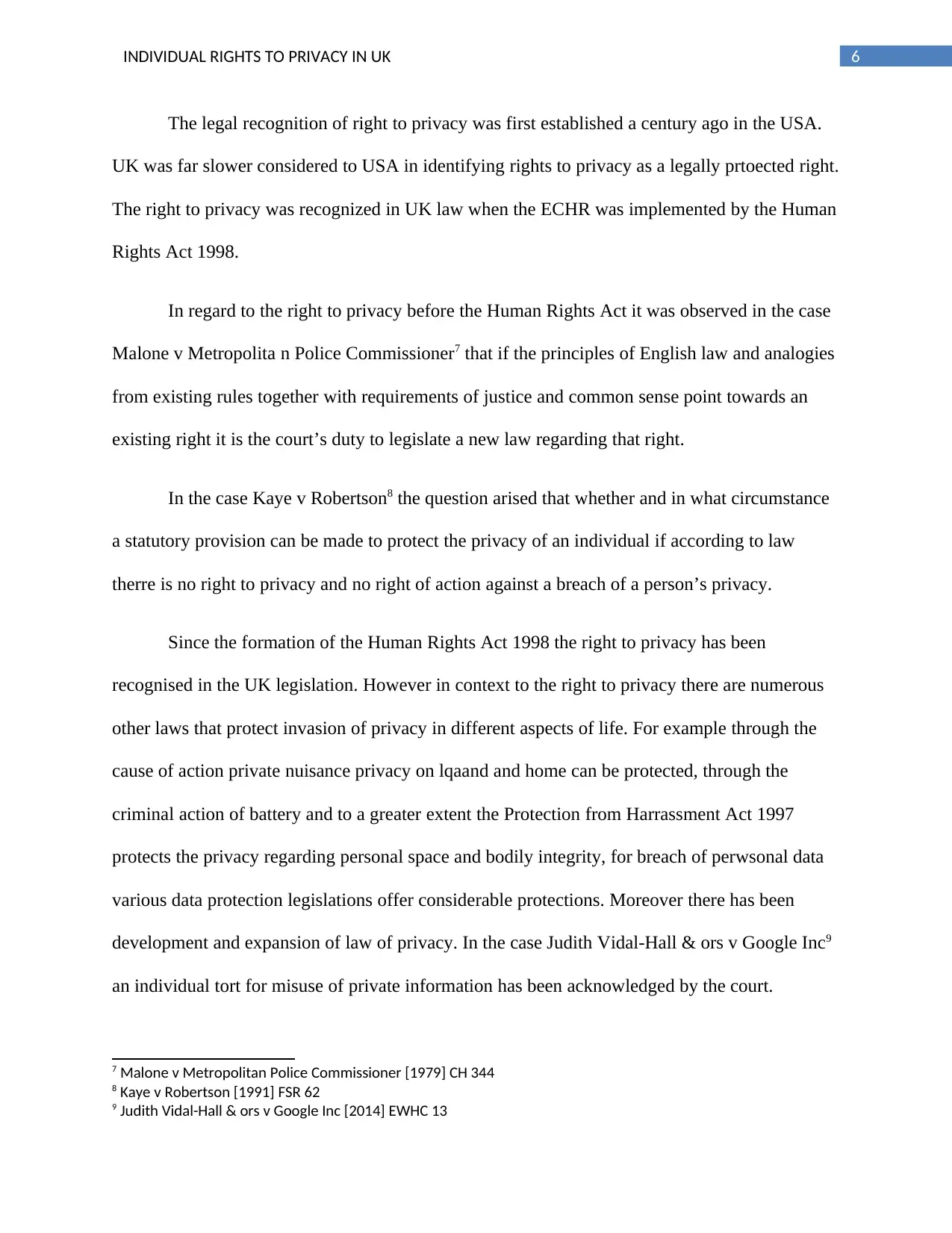
6INDIVIDUAL RIGHTS TO PRIVACY IN UK
The legal recognition of right to privacy was first established a century ago in the USA.
UK was far slower considered to USA in identifying rights to privacy as a legally prtoected right.
The right to privacy was recognized in UK law when the ECHR was implemented by the Human
Rights Act 1998.
In regard to the right to privacy before the Human Rights Act it was observed in the case
Malone v Metropolita n Police Commissioner7 that if the principles of English law and analogies
from existing rules together with requirements of justice and common sense point towards an
existing right it is the court’s duty to legislate a new law regarding that right.
In the case Kaye v Robertson8 the question arised that whether and in what circumstance
a statutory provision can be made to protect the privacy of an individual if according to law
therre is no right to privacy and no right of action against a breach of a person’s privacy.
Since the formation of the Human Rights Act 1998 the right to privacy has been
recognised in the UK legislation. However in context to the right to privacy there are numerous
other laws that protect invasion of privacy in different aspects of life. For example through the
cause of action private nuisance privacy on lqaand and home can be protected, through the
criminal action of battery and to a greater extent the Protection from Harrassment Act 1997
protects the privacy regarding personal space and bodily integrity, for breach of perwsonal data
various data protection legislations offer considerable protections. Moreover there has been
development and expansion of law of privacy. In the case Judith Vidal-Hall & ors v Google Inc9
an individual tort for misuse of private information has been acknowledged by the court.
7 Malone v Metropolitan Police Commissioner [1979] CH 344
8 Kaye v Robertson [1991] FSR 62
9 Judith Vidal-Hall & ors v Google Inc [2014] EWHC 13
The legal recognition of right to privacy was first established a century ago in the USA.
UK was far slower considered to USA in identifying rights to privacy as a legally prtoected right.
The right to privacy was recognized in UK law when the ECHR was implemented by the Human
Rights Act 1998.
In regard to the right to privacy before the Human Rights Act it was observed in the case
Malone v Metropolita n Police Commissioner7 that if the principles of English law and analogies
from existing rules together with requirements of justice and common sense point towards an
existing right it is the court’s duty to legislate a new law regarding that right.
In the case Kaye v Robertson8 the question arised that whether and in what circumstance
a statutory provision can be made to protect the privacy of an individual if according to law
therre is no right to privacy and no right of action against a breach of a person’s privacy.
Since the formation of the Human Rights Act 1998 the right to privacy has been
recognised in the UK legislation. However in context to the right to privacy there are numerous
other laws that protect invasion of privacy in different aspects of life. For example through the
cause of action private nuisance privacy on lqaand and home can be protected, through the
criminal action of battery and to a greater extent the Protection from Harrassment Act 1997
protects the privacy regarding personal space and bodily integrity, for breach of perwsonal data
various data protection legislations offer considerable protections. Moreover there has been
development and expansion of law of privacy. In the case Judith Vidal-Hall & ors v Google Inc9
an individual tort for misuse of private information has been acknowledged by the court.
7 Malone v Metropolitan Police Commissioner [1979] CH 344
8 Kaye v Robertson [1991] FSR 62
9 Judith Vidal-Hall & ors v Google Inc [2014] EWHC 13
Paraphrase This Document
Need a fresh take? Get an instant paraphrase of this document with our AI Paraphraser
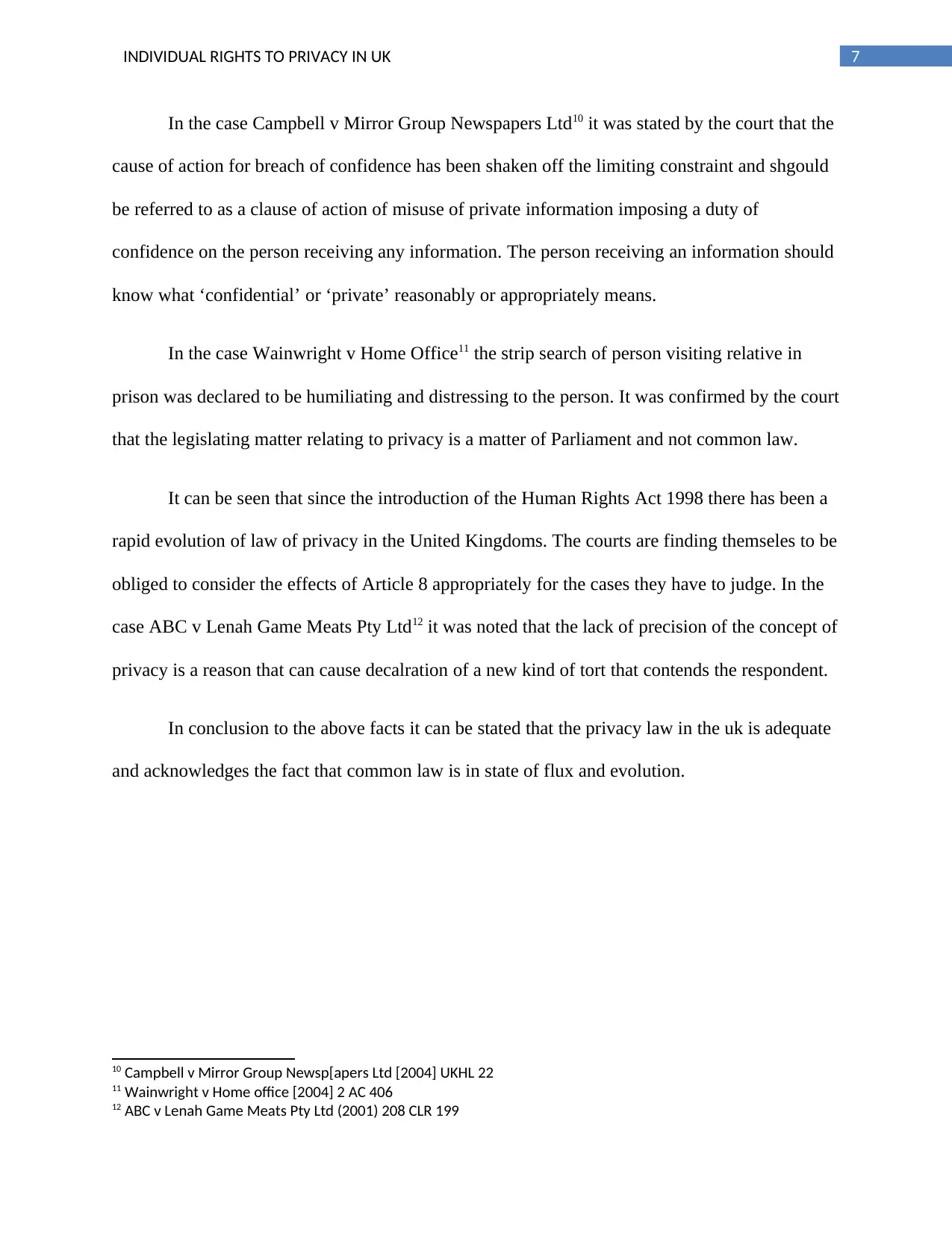
7INDIVIDUAL RIGHTS TO PRIVACY IN UK
In the case Campbell v Mirror Group Newspapers Ltd10 it was stated by the court that the
cause of action for breach of confidence has been shaken off the limiting constraint and shgould
be referred to as a clause of action of misuse of private information imposing a duty of
confidence on the person receiving any information. The person receiving an information should
know what ‘confidential’ or ‘private’ reasonably or appropriately means.
In the case Wainwright v Home Office11 the strip search of person visiting relative in
prison was declared to be humiliating and distressing to the person. It was confirmed by the court
that the legislating matter relating to privacy is a matter of Parliament and not common law.
It can be seen that since the introduction of the Human Rights Act 1998 there has been a
rapid evolution of law of privacy in the United Kingdoms. The courts are finding themseles to be
obliged to consider the effects of Article 8 appropriately for the cases they have to judge. In the
case ABC v Lenah Game Meats Pty Ltd12 it was noted that the lack of precision of the concept of
privacy is a reason that can cause decalration of a new kind of tort that contends the respondent.
In conclusion to the above facts it can be stated that the privacy law in the uk is adequate
and acknowledges the fact that common law is in state of flux and evolution.
10 Campbell v Mirror Group Newsp[apers Ltd [2004] UKHL 22
11 Wainwright v Home office [2004] 2 AC 406
12 ABC v Lenah Game Meats Pty Ltd (2001) 208 CLR 199
In the case Campbell v Mirror Group Newspapers Ltd10 it was stated by the court that the
cause of action for breach of confidence has been shaken off the limiting constraint and shgould
be referred to as a clause of action of misuse of private information imposing a duty of
confidence on the person receiving any information. The person receiving an information should
know what ‘confidential’ or ‘private’ reasonably or appropriately means.
In the case Wainwright v Home Office11 the strip search of person visiting relative in
prison was declared to be humiliating and distressing to the person. It was confirmed by the court
that the legislating matter relating to privacy is a matter of Parliament and not common law.
It can be seen that since the introduction of the Human Rights Act 1998 there has been a
rapid evolution of law of privacy in the United Kingdoms. The courts are finding themseles to be
obliged to consider the effects of Article 8 appropriately for the cases they have to judge. In the
case ABC v Lenah Game Meats Pty Ltd12 it was noted that the lack of precision of the concept of
privacy is a reason that can cause decalration of a new kind of tort that contends the respondent.
In conclusion to the above facts it can be stated that the privacy law in the uk is adequate
and acknowledges the fact that common law is in state of flux and evolution.
10 Campbell v Mirror Group Newsp[apers Ltd [2004] UKHL 22
11 Wainwright v Home office [2004] 2 AC 406
12 ABC v Lenah Game Meats Pty Ltd (2001) 208 CLR 199
1 out of 8
Related Documents
Your All-in-One AI-Powered Toolkit for Academic Success.
+13062052269
info@desklib.com
Available 24*7 on WhatsApp / Email
![[object Object]](/_next/static/media/star-bottom.7253800d.svg)
Unlock your academic potential
Copyright © 2020–2026 A2Z Services. All Rights Reserved. Developed and managed by ZUCOL.




